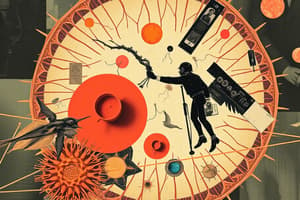Podcast
Questions and Answers
What is cell biology?
What is cell biology?
The branch of biology that deals with the structure, function, and behavior of cells, the fundamental units of life.
What are the main components of a cell?
What are the main components of a cell?
Cell membrane, nucleus, mitochondria, ribosomes, endoplasmic reticulum (ER).
What is the main function of the cell membrane?
What is the main function of the cell membrane?
Regulating the movement of substances into and out of the cell.
What is the role of mitochondria in a cell?
What is the role of mitochondria in a cell?
What is the function of the Golgi apparatus?
What is the function of the Golgi apparatus?
What is the process of converting nutrients into energy and other essential molecules called?
What is the process of converting nutrients into energy and other essential molecules called?
What are the two main types of cell reproduction?
What are the two main types of cell reproduction?
What is the result of mitosis?
What is the result of mitosis?
What is the result of meiosis?
What is the result of meiosis?
What does cell biology provide a deeper understanding of?
What does cell biology provide a deeper understanding of?
What are the eight parts of speech in the English language?
What are the eight parts of speech in the English language?
How do adjectives modify or describe nouns or pronouns?
How do adjectives modify or describe nouns or pronouns?
What are the main characteristics of verbs in the English language?
What are the main characteristics of verbs in the English language?
How do adverbs modify or describe words in the English language?
How do adverbs modify or describe words in the English language?
What is the function of prepositions in English grammar?
What is the function of prepositions in English grammar?
Explain the role of conjunctions in connecting words, phrases, or clauses.
Explain the role of conjunctions in connecting words, phrases, or clauses.
What is the purpose of interjections in English language?
What is the purpose of interjections in English language?
Describe the significance of subject-verb agreement in English grammar.
Describe the significance of subject-verb agreement in English grammar.
What are some key aspects of English grammar related to tense?
What are some key aspects of English grammar related to tense?
Explain the impact of technology and the internet on English grammar in the digital age.
Explain the impact of technology and the internet on English grammar in the digital age.
Study Notes
Biology: A Comprehensive Overview
Biology is the scientific study of living organisms, their structure, function, behavior, and evolution. It is a vast field with numerous subtopics, each focusing on specific aspects of life. One of the most fundamental subtopics within biology is cell biology.
Cell Biology: The Building Blocks of Life
Cell biology is the branch of biology that deals with the structure, function, and behavior of cells, which are the fundamental units of life. Cells are the smallest units of life that can grow, maintain homeostasis, and reproduce. They are the building blocks that make up all living organisms, from the simplest bacteria to the most complex organisms, such as humans.
Cell Structure
Cells are complex structures composed of various organelles and structures that perform specific functions. Some of the main components of a cell include:
- Cell membrane: A selectively permeable membrane that regulates the movement of substances into and out of the cell.
- Nucleus: The control center of the cell, containing the genetic material (DNA).
- Mitochondria: Energy-producing organelles that generate ATP through cellular respiration.
- Ribosomes: Organelles responsible for protein synthesis.
- Endoplasmic reticulum (ER): A network of tubules involved in various cellular processes, such as protein synthesis and lipid biosynthesis.
- Golgi apparatus: An organelle responsible for modifying, sorting, and packaging proteins and lipids for transport to their final destinations.
Cell Function
Cells carry out a wide range of functions essential for the survival and proper functioning of an organism. Some of these functions include:
- Metabolism: The process of converting nutrients into energy and other essential molecules.
- Growth and division: Cells grow and divide to increase the size of an organism or to repair damaged tissues.
- Homeostasis: Cells maintain a stable internal environment, balancing various factors such as pH, temperature, and water concentration.
- Communication: Cells communicate with each other through various signaling pathways to coordinate their activities and maintain the overall health of the organism.
Cell Reproduction
Cells reproduce to produce new cells for growth, repair, and the development of an organism. There are two main types of cell reproduction: mitosis and meiosis.
- Mitosis: A process of cell division that results in two identical daughter cells, each with the same number and type of chromosomes as the parent cell. This process is used for growth and repair.
- Meiosis: A process of cell division that results in four genetically unique daughter cells, each with half the number of chromosomes as the parent cell. This process is used for sexual reproduction.
Conclusion
Biology is a diverse and fascinating field that encompasses the study of living organisms and their various structures, functions, and behaviors. Cell biology, in particular, provides a deeper understanding of the fundamental units of life, their structure, and the various functions they perform. As our knowledge of biology continues to expand, we gain a better appreciation for the complexity and beauty of life at the cellular level.
Studying That Suits You
Use AI to generate personalized quizzes and flashcards to suit your learning preferences.
Description
Explore the fundamental aspects of cell biology, including cell structure, function, and reproduction. Gain insights into the building blocks of all living organisms and their essential roles in maintaining life.




